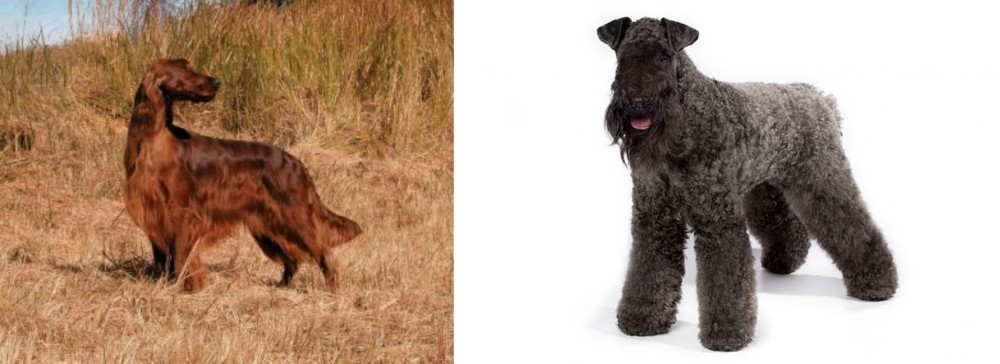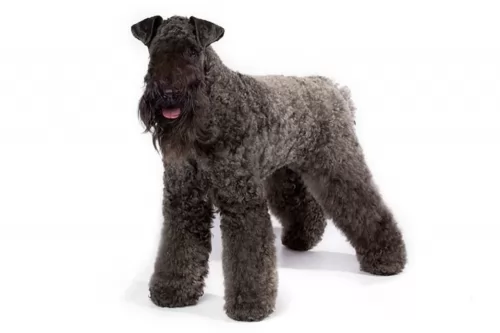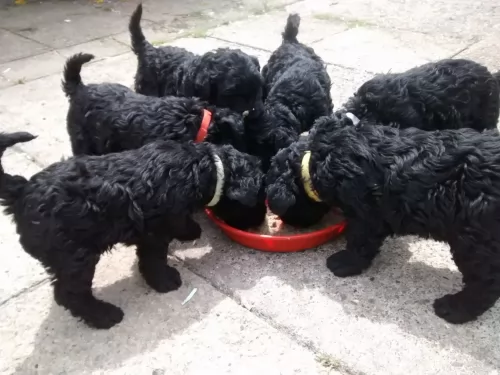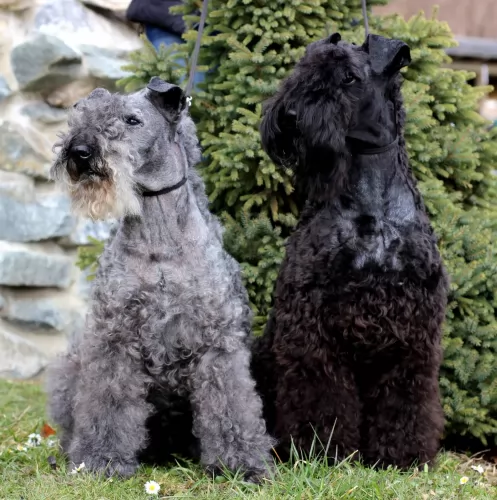 Petzlover
Petzlover Both Irish Setter and Kerry Blue Terrier are originated from Ireland. Irish Setter may grow 20 cm / 8 inches higher than Kerry Blue Terrier. Irish Setter may weigh 16 kg / 36 pounds more than Kerry Blue Terrier. Both Irish Setter and Kerry Blue Terrier has same life span. Irish Setter may have more litter size than Kerry Blue Terrier. Both Irish Setter and Kerry Blue Terrier requires Moderate Maintenance.
Both Irish Setter and Kerry Blue Terrier are originated from Ireland. Irish Setter may grow 20 cm / 8 inches higher than Kerry Blue Terrier. Irish Setter may weigh 16 kg / 36 pounds more than Kerry Blue Terrier. Both Irish Setter and Kerry Blue Terrier has same life span. Irish Setter may have more litter size than Kerry Blue Terrier. Both Irish Setter and Kerry Blue Terrier requires Moderate Maintenance.
 The Irish Setter is a gun dog, originating in Ireland and recognized by his beautiful red or mahogany coat.
The Irish Setter is a gun dog, originating in Ireland and recognized by his beautiful red or mahogany coat.
Descending from the Setter group, the Irish Setter, also known as the Red Setter, has a solid pedigree. It was in the 1800s that they were brought to the United States.
The Irish Setter wasn't always what it looks like today and in fact the solid red color was created because of selective breeding practices. The Irish Setter has long medium length floppy ears, brown eyes and he is deep chested.
 The Kerry Blue Terrier hails from Ireland, with the name of the dog coming from a place known as County Kerry, and Blue being the color of the dog's coat.
The Kerry Blue Terrier hails from Ireland, with the name of the dog coming from a place known as County Kerry, and Blue being the color of the dog's coat.
The Kerry Blue was originally bred to control rats, rabbits and otters and was actually a working dog for a host of different jobs.
It was in 1922 that the United States Kerry Blue Terrier Club was founded and recognized by the AKC in 1924.
 The Irish Setter is a large dog, beautiful and elegant looking, standing at 61 to 71cm in height and weighing anything from 25 to 34kg, males and females.
The Irish Setter is a large dog, beautiful and elegant looking, standing at 61 to 71cm in height and weighing anything from 25 to 34kg, males and females.
The coat is a rich red color and is short to medium length but feathers in places such as the tail, the chest and abdomen, the legs and the tail. The head is long and lean, the ears are long and silky and the tail long and feathery.
The Irish Setter is a playful, friendly, sweet, mischievous, high energy dog who makes a superb family pet, getting on well with children in the home.
It was noticed that in about 1845, Setters in Ireland were mostly red, red and white or even a mustardy-lemon type of color, but there was preference for the solid red coloring. The breed standard for the modern Irish Setter was drawn up in Dublin by the Irish Red Setter Club and approved in 1886.
The dog was essentially bred for hunting game birds, using their excellent sense of smell to locate the bird. He is an alert, intelligent dog and will learn easily. Training and socialization will make him obedient and relaxed.
He isn't an assertive kind of breed and therefore isn't going to make the best of watchdogs. They've got such amicable, kind temperaments that they make popular therapy dogs.
 The Kerry Blue is a small dog standing at between 44 to 51cm and weighing anything between 15 and 18kg. He has dark eyes which give him that typical alert Terrier expression.
The Kerry Blue is a small dog standing at between 44 to 51cm and weighing anything between 15 and 18kg. He has dark eyes which give him that typical alert Terrier expression.
The ears are small and are carried up before flopping down. The high-set tail has always been customarily docked, giving him a compact, jaunty appearance but these days, the tail tends to be left long, curling somewhat over the back.
He has a coat which is quite wavy or curly and comes in different shades of grey or blue, while the puppies are born black, gradually becoming more blue. The dog is considered to be hypoallergenic as it doesn't shed a lot.
Kerry Blue Terriers are strong willed dogs, but with training and socialization they respond well to instructions such as sit, come, lie-down and stay. As a Terrier breed he is feisty, lively, strong-willed, stubborn, independent and impulsive. They are loyal and affectionate towards their owners and are amicable with children and pets in the home.
Training and socialization develops a balanced attitude around his human family, other animals in the home and around strangers. He is an active dog too so whether he lives in the city or the countryside, he will require a lot of exercise as he is full of life.
You can’t just put him in the backyard and forget about him. He is an intelligent, social dog who will only do well when he is counted in as a family member.
 Irish Setters are going to make you a wonderful pet. He has a friendly, confident disposition that makes them ideal pets for families with children who have been taught how to respect- and be kind to animals.
Irish Setters are going to make you a wonderful pet. He has a friendly, confident disposition that makes them ideal pets for families with children who have been taught how to respect- and be kind to animals.
He is a big dog, but with training and socialization he becomes well behaved and obedient. Social and outgoing, this is a dog which just loves the companionship of their human family and will require a good deal of exercise too.
Keep him well exercised, feed him good food that promotes health, give him a nice warm, dry place to sleep and he’ll fit perfectly well into your family and make a splendid pet.
 When you bring a Kerry Blue Terrier into your home and your life, you’re going to have a jaunty, lively, comical pet in your home, as he certainly has the reputation of making people laugh.
When you bring a Kerry Blue Terrier into your home and your life, you’re going to have a jaunty, lively, comical pet in your home, as he certainly has the reputation of making people laugh.
He is such an intelligent dog too and has no difficulty with learning new tricks. He takes his role of watchdog seriously too, as he loves his human family and wants to be looking out for them.
When you bring a Kerry Blue Terrier into your home, you can be assured of jolly good fun from a true canine companion.
 Irish Setters are quite a healthy breed but they are also prone to getting some of the common dog illnesses such as hip dysplasia, cancer, bloat and canine leukocyte adhesion deficiency.
Irish Setters are quite a healthy breed but they are also prone to getting some of the common dog illnesses such as hip dysplasia, cancer, bloat and canine leukocyte adhesion deficiency.
Known as CLAD, this is a disease of the immune system found in Irish Setters. True, it is a rare disease and affected animals show signs of skin lesions, bone disorders, anorexia and generalized lymphadenopathy.
Irish Setters can develop bloat, a life-threatening condition where the stomach distends with gas and can twist. This is known as gastric torsion and you’ll see your dog’s restlessness. He may even ‘hide away’ somewhere, lying down and drooling, while trying to vomit. This is an illness which requires immediate veterinary intervention.
 You aren’t going to be running to the vet often with your Kerry Blue as he is a healthy dog breed. However there are some common dog diseases that even the most healthiest of dogs can succumb to.
You aren’t going to be running to the vet often with your Kerry Blue as he is a healthy dog breed. However there are some common dog diseases that even the most healthiest of dogs can succumb to.
Always feed your dog the very best food there is so that he has a strong immune system that can fight off disease.
This is the inward rolling of the eyelid which can irritate the dog’s eye and even cause vision loss. Surgery can treat the problem.
Every dog can succumb to cancer. You may well find a lump or even detect a sore that won’t heal. Treatments for cancer can include medicines, chemotherapy and surgery.
This is an inherited condition to do with the hip joint. It can result in pain for your dog and even lameness. When you discover your pet no longer wants to play and he battles to get up after lying down, he will need to go to the vet. Dogs with this debilitating disease should never be bred.
 Irish Setters are lean and muscular and an active breed. They love nothing more than to run off in wide open spaces, and if you live in the city and have a large garden, he will need to be taken on long walks. If he is a country dog, he may well run off and be gone for an hour or two before he returns home.
Irish Setters are lean and muscular and an active breed. They love nothing more than to run off in wide open spaces, and if you live in the city and have a large garden, he will need to be taken on long walks. If he is a country dog, he may well run off and be gone for an hour or two before he returns home.
They are dogs which are used to having a job to do such as hunting, so he won't do well if he is put into a small back yard and left to his own device. He is a social dog and wants to be with his human family, relying on them to include him in all their activities.
Your Irish Setters is a lean, muscular, active dog, and to keep him that way he will require a nutritious diet. If you feed him commercially manufactured kibble, make sure it is the very best quality one. It is a good idea to mix in protein such as cooked chicken, brown rice and vegetables. Some raw meat added in from time to time can be very beneficial to him too.
With your beautiful Irish Setter, it is best to avoid feeding your dog processed foods altogether. A good diet is essential for good health. Never leave your dog without a constant supply of cool, fresh water.
The Red Setter’s coat is fairly long on the body but short and smooth on the head. The coat will need to be brushed at least twice a week to prevent matting.
Trim his nails as needed, and find out how to keep his teeth healthy too with vet approved canine dog toothpaste- and brush.
Also check his long, floppy ears because it is so easy for ear infections to develop with these long-eared dogs.
 The Kerry Blue’s coat doesn’t shed a lot but it’s a curly coat that will require brushing at least twice a week. He will also require clipping and trimming if you want to keep the coat manageable.
The Kerry Blue’s coat doesn’t shed a lot but it’s a curly coat that will require brushing at least twice a week. He will also require clipping and trimming if you want to keep the coat manageable.
Nutrition is a key part of a healthy Kerry Blue Terrier and instead of just plonking down a bowl of dry kibble every day, make his mealtimes something to look forward to, more sustaining and more interesting.
Top quality kibble is good every now and then but try mixing in some cooked chicken, brown rice, pasta and vegetables occasionally as well as a little bit of raw meat. You will be rewarded with bright eyes, a wet nose, bushy, wagging tail and less trips to the vet.
Make sure there is always a supply of fresh, cool water for him.
Active and lively, your Kerry Blue will need lots of robust exercise – a daily walk as well as ball games which ensure his muscles are kept strong and toned. Not only that, this exercise is important for keeping him fit and also mentally alert.